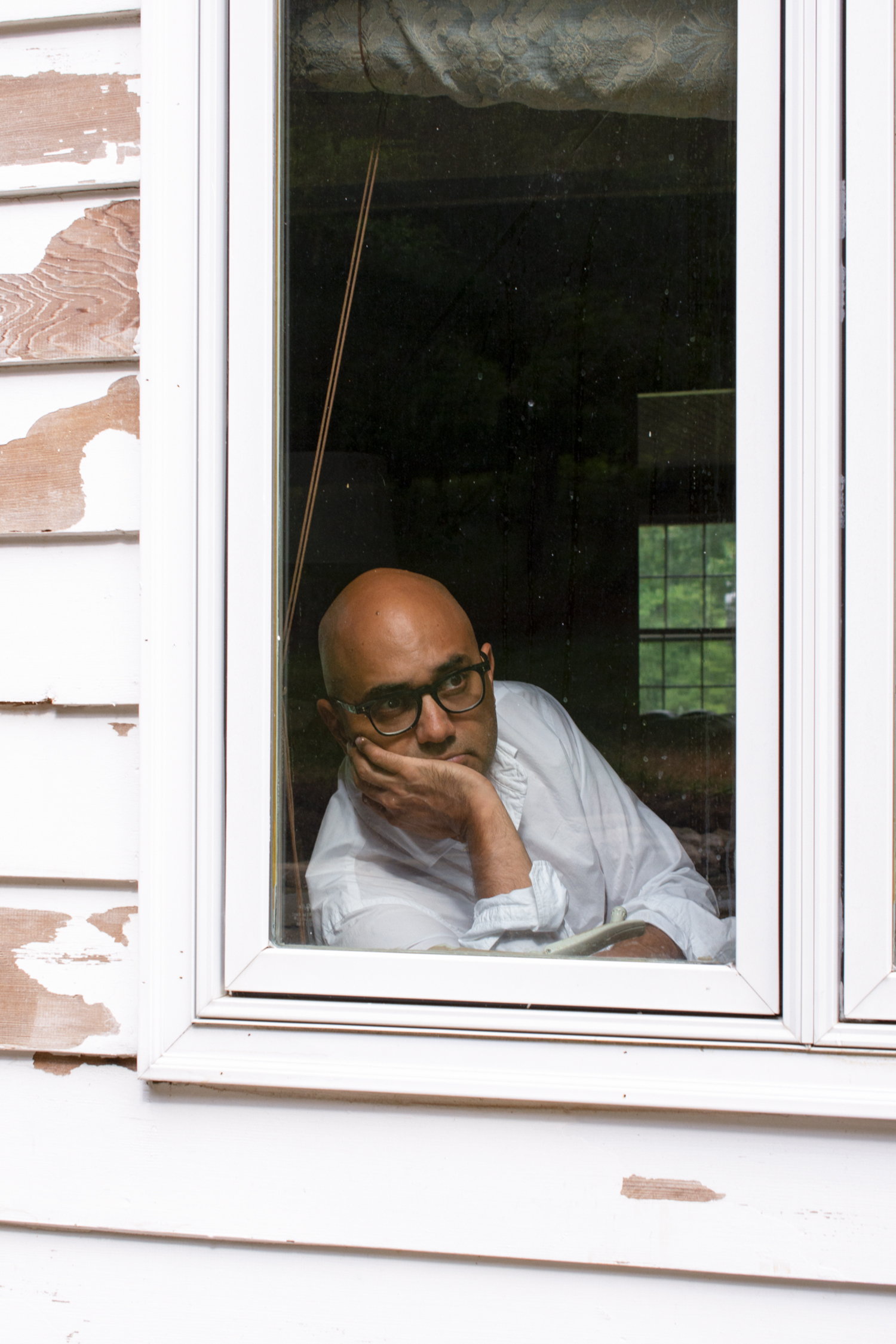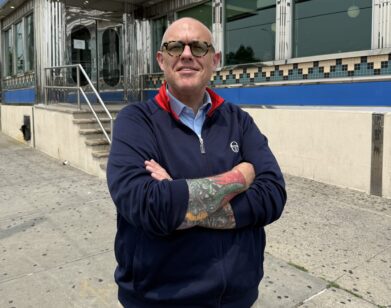literature
Ayad Akhtar and Aasif Mandvi Investigate the Rot at America’s Core

By the time many of you read this, the United States will be in a very different place than it was in mid-August, when this interview was conducted between the writer Ayad Akhtar and the actor Aasif Mandvi. Already a battleground, it will have either gotten much worse or much better. Most people—even writers, artists, and actors—like to think the future will be a brighter and more hopeful place that makes just a bit more sense than it does at present. Akhtar, the 49-year-old playwright, screenwriter, and novelist (in each of those fields he is a distinguished virtuoso), is not one of them. In fact, much of his work is about facing and exploring hot zones of social, political, and personal discomfort. Take, for instance, his Pulitzer Prize–winning debut play, 2012’s Disgraced (starring the talented Mandvi in the original Broadway production), where a casual Upper East Side dinner party quickly transforms into an explosive study of race, sex, and betrayal, adding dynamite to the myth that in liberal enclaves like Manhattan, people of vastly different backgrounds all live in harmony and peace. Or take American Dervish, his debut novel from that same year, which tells the coming-of-age story of a Pakistani-American boy in a suburb of Milwaukee (Akhtar’s stories often hew close to his biography, as he, too, was once a Pakistani-American boy growing up in Wisconsin). Throughout his work, Akhtar takes aim at American culture and its lies of acceptance, as well as lost homelands and their own delusions and horrors.
His latest novel, this fall’s Homeland Elegies (Little, Brown), might be his most ambitious work yet, using the facts of his own life as the backbone of a fiction that explores the dying dream of a lost republic. There are no celebrations in sight. Instead, time and again, Akhtar diagnoses the fundamental rot at the core: “Trump had just felt the national mood, and his particular genius was a need for attention so craven, so unrelenting, he was willing to don any and every shade of our moment’s ugliness, consequences be damned.” Akhtar’s broad worldview will be put to use in the years ahead; he’s just been named the new president of PEN America, the human rights and literary organization. It’s hard to think of a writer better suited to the task. But back to the worse or better time of mid-August. Akhtar and Mandvi first met when they worked together on the 2005 film The War Within. The writer and actor are on the phone, thinking about where and when this invention called America started to break. —CHRISTOPHER BOLLEN
———
AASIF MANDVI: I feel like we’re speed dating! How are you?
AYAD AKHTAR: I’m okay. When we came upstate in March, Annika [Boras, Akhtar’s fiancée] and I were talking about when we were going to have a better sense of things. I thought, “Probably by July we’ll have a better sense of what’s going on.” It’s mid-August, and it’s even less clear now than it was in March. So that’s dispiriting, along with all the political chaos. I also have friends who just don’t have any money anymore. So, if I’m picking up signs of what’s to come, this is going to get a lot worse.
MANDVI: We went to Atlanta. We’ve been staying with my mother-in-law down here. It’s my wife’s childhood home, and we have a baby, so it’s been great to have some land to run around on. It’s much better than traipsing around the East Village. But there’s just an extreme level of anxiety for everyone. Everyone is asking what the future will look like. What does that mean for you in terms of the theater?
AKHTAR: Right now, the theater’s dead. Jim Shapiro, the great American Shakespearean scholar, is a student of the early 1600s plague that shut down all the London theaters. And he isn’t sure a lion’s share of American theaters are going to survive. I’m on the board at a couple of them and they have strong balance sheets. But there’s only so much that a strong balance sheet can protect you from.
MANDVI: I worry about the smaller theaters.
AKHTAR: Oh, yeah. Many of them aren’t going to survive.
MANDVI: Some of the smaller theaters in New York are where playwrights develop their work. A lot of plays don’t start on Broadway. And it’s those losses that worry me.
AKHTAR: I wonder at what point people will even be comfortable sitting in close proximity, cheek-by-jowl with strangers in enclosed spaces.
MANDVI: I hope you’re still writing plays.
AKHTAR: Right now, I’m writing a show for TV. We sold it just before the pandemic, so I’m gainfully employed for the time being. And I have the novel coming out.
MANDVI: I first read it a few months ago. I hate to give you compliments because I know that you take compliments very seriously. [Laughs] Insults slide right off your back, but compliments you take seriously.
AKHTAR: It’s not that. We’re in show business—whether it’s publishing or theater or film and TV—where flattery is a currency. So it’s hard to take any of it seriously because everyone is constantly kissing everybody’s ass. It’s just a kind of practiced discipline to not let compliments in, because 99 percent of the time they’re horseshit.
MANDVI: Do you read your reviews?
AKHTAR: I kind of avoid them now after having been through so many cycles and seeing just how subjective things really are, and understanding how much the agenda of the critic and their worldview informs what they write. There are a couple of people in the theater who I take seriously because they’re disciplined about wanting to help writers. For the most part, it’s hard to take criticism today seriously when the standard isn’t about either the tradition or trying to have a substantial commentary about what the work is saying about the world. But understandably, papers are cutting their critics and cutting their theater coverage, and everybody’s clamoring for attention. So everybody becomes a salesman and it’s hard to take the criticism seriously.
MANDVI: With the subjects you’ve often written about—the immigrant experience, Islam, war—do you feel like critics understand what you’re trying to say? You write on subjects and lives that very few novelists and playwrights tackle. Does that lead to misunderstanding?
AKHTAR: Yeah, totally. I often joke that the only reason I have a career is because I’ve been misunderstood and positively written about. That said, I do think there are critics out there who do their homework and love the form and are trying to contribute meaningfully to the conversation about making work in this country. There have been a few critics who’ve really helped me grow as an artist, and there have been a lot of critics who have just gotten in the way, sometimes woefully so.
MANDVI: I’m going to give you a compliment. When I read your work—and this includes Disgraced and American Dervish as well as Homeland Elegies—I feel like you’re articulating something that’s inside of me, something I can’t even express. I’ve been thinking about the title Homeland Elegies. There’s a mythology that ends up happening around the immigrant experience involving their homelands—both their adopted homeland and the one they come from. I grew up in England. You grew up here in America. But we share this idea of standing between one homeland and another.
AKHTAR: I’m intrigued by the word you used: mythology. I think that a lot of what passes for culture and history is mythology. I grew up in between two mythologies. One was my parents’ experience and ideological understanding of where they came from—Pakistan, and the Muslim underpinnings of all of that. On the other side, there’s America and the alleged belief in equality and opportunity and all that nonsense, when in fact the country is really just about money and race. It’s seeing, on one hand, the gap between what my parents say Pakistan is about and what it really seems to be about, and, on the other hand, seeing the gap between what my cohorts at school and our textbooks say about America, and seeing what it really is. I think at its best, being an outsider can give you that kind of perspective. Obviously, there are some downsides. You feel like you don’t belong. But there are advantages to it as well.
MANDVI: You wrote this book before the pandemic. I’ve been thinking that this pandemic and the Trump presidency have worked in collusion, as it were, to rip apart this mythology of American exceptionalism in a way I’ve never seen in my lifetime.
AKHTAR: Yes, this novel was written well before the pandemic, but any observant citizen has been seeing the fraying of the social fabric for a long time. In my opinion, we’re a half-century into the decay of the republic. The book is really a kind of tour through a decaying country, one that is dying and is not going to come back to life, which is why it’s called Homeland Elegies. The radical ideological shift that has enabled the individualism at the root of American life to prevail over any collective sense of good or what is right for the country—or whether it’s right to make as much money as you want, or the right to profit individually off the national infrastructure, or the right to fly whatever flag around your identity that you believe is the most important value this country should protect—all of it is about individualism. At its root, I think that’s the cause of this frayed social fabric. We’re living increasingly in a world where the criminals are in power. There’s a reason for that: the fraying world order. These are serious, pivotal moments in history. I really am not convinced that we are in any meaningful way taking seriously the challenges that face us.
MANDVI: Do you think that Trump was inevitable?
AKHTAR: Oh, yeah. I don’t think Trump is the problem. I think Trump is the symptom. Trump is the embodiment of everything that America has become, and our unwillingness to recognize that he is a reflection of who we are is part of the problem, and why it’s not going to go away even if he’s not in power. The book begins with a chapter about the narrator’s father having an incidental relationship with Donald Trump in the ’90s. It tracks Trump as a metaphor throughout the entire book for a reason, because Trump’s outsize appetite for debt and untruth and lack of consequence—it’s pure individualism, run absolutely amok.
MANDVI: It’s all the things about America that our traditional Muslim parents back home warned us about. They warned us about individualism.
AKHTAR: Yeah. It turns out that the longstanding postcolonial Muslim critique of Western society was not entirely wrong. That’s exactly where the two things that I had been writing about for so many years—the critique of the Islamic mythos and the critique of the capitalist mythos—meet. People wouldn’t necessarily understand that if they didn’t know anything about the history of Muslim society, and that goes back to our conversation about critics. Do they have the context to make sense of what it is that we’re doing? It’s a dilemma for us as artists: How do we both fold in the information that’s necessary to bring non-Muslims along? And how do we also engage them at a primary level where they’re living and breathing? Not just so it’s an expository tour through our histories, but also, what’s the relevance to American life today? I think the book makes a case that being Muslim in America is actually a really good perspective from which to understand America. And perhaps we understand America better, in part because of the consequences of American foreign policy and the persona that America has had on the world stage. Muslims around the world might have had a more treacherous version of that experience, at least in this half-century.

MANDVI: Back when we were doing Disgraced, you talked about this idea that when you were first writing, you were trying to imitate or mimic the great Western writers. Then there came a point when you turned and looked at the thing you were most afraid of and started writing that. Did I get that story right?
AKHTAR: Mostly. I had a high school teacher who really changed my life. She loved Central European modernism and taught herself to read German so that she could read [Rainer Maria] Rilke in the original language. For a really long time, Central European modernism was the thing I aspired to. It took a good 20 years to realize that writing like a writer from some Swiss canton wasn’t going to reflect my experience. I think time disabused me of the will to be somebody other than who I am, and at that point I started to pay attention to what I had been ignoring. It was really an explosion of creativity, and that was when American Dervish and Disgraced and all those plays came out.
MANDVI: What was it specifically that you’d been ignoring?
AKHTAR: My own experience. The dilemmas of a Muslim community in the Midwest and the various aspects of life as I saw them lived. I didn’t feel particularly excluded where I grew up. Southern Wisconsin was a very warm and welcoming place. But probably on some unconscious level, I was convinced nobody would care about that stuff. I certainly wasn’t reading about stories like mine. Salman [Rushdie] was the only one. When I read The Satanic Verses, it was like, “Oh my god. This is me.” There was so little of that.
MANDVI: You talk about that in the book.
AKHTAR: There’s a whole section about Salman in which one of my aunts goes on at great length about how much she hates him. I was a little afraid to give the book to Salman. Then he read it and gave me an amazing blurb, and I was like, “Wow, he’s really a stand-up guy.”
MANDVI: I think he’s probably heard it all. There’s very little you can say to Salman about his work that he hasn’t already heard. You have also said that you wrote this book in a fever dream. I know you wrote it after a horrible, tragic period where both your parents died.
AKHTAR: I finished the last chapter, which is about my father, the very day that he fell, hit his head, ended up in ICU, and passed away days later. I finished it that very day.
MANDVI: What was the impetus for writing this book?
AKHTAR: I was in Rome reading a lot of classical stuff. Trump had been in office for a year, and I had immersed myself in a wider perspective on historical events. I read this poem by [the Italian philosopher Giacomo] Leopardi that was entitled “To Italy.” He was addressing his fellow Italians in this poem from the early 1800s. Something caught in my head: “Would it be possible to have a voice today in which I could address my fellow Americans? Could I craft a narrative voice that would speak to America as he was speaking to Italy?” I went to sleep that night, and the next morning I woke up and I already had the first words of the overture on my mind. So I wrote that overture in the course of a morning and afternoon, and that was the whole book in microcosm. It was the whole project, the Whitman-esque project of singing the country’s multitudes. Not singing them in celebration, but singing them in lament. I didn’t know what the next section would be. I just knew I’d written this overture. Then one thing led to the next. It was the first anniversary of the inauguration of Donald Trump, so that section came out of me. Then I’d written a section about my father, and then I had to write a section about my mother. There was about an 11-month span when I was kind of writing into the dark. But as I wrote, I started to realize that there was a lot of coherence and it was telling a story. I wanted to tell the story of my own journey but also about the journey of America and what’s happened to the country, about the gap between what my parents thought it was and what it had become.
MANDVI: But you chose not to write a memoir.
AKHTAR: I don’t think a memoir could have had the amplitude to encompass what’s happened to America. I don’t think any individual person’s journey could ever tell the story of what’s happened to the Republic. So I had to shape and sharpen and deform and expand and inflate and compress and collate. The goal was to do it through the frame of an individual voice, and that individual voice would be addressing his fellow citizens at all times. Ultimately the book’s not about me. It’s about America. I’m irrelevant, ultimately. I’m just a cipher. I say “I” in quotes. The narrator has my name and many of the facts of my life, but he’s obviously in meaningful ways not me as well.
MANDVI: A lot of the criticism you received from Disgraced came from the Muslim community.
AKHTAR: Yeah, of course. And it continues.
MANDVI: Do you still feel the burn of having that experience from “your own community”?
AKHTAR: I mean, it’s hard not to. We live in a time when our writers are seen as advocates and cheerleaders for marginalized communities. Our job is to make our communities look good. When has that ever been the job of an artist? That’s the job of advertising. That’s PR. I’d get paid a lot better if I was doing that rather than doing what I do. The only value of an artist is ultimately to ask meaningful questions. That’s usually hard to countenance on the part of the communities that are getting asked those questions. I have my own thoughts about how it’s happened that artists have turned into these sort of milquetoast effigies for individual rights. But yeah, of course, it hurts. It hurts to write about your community and to feel that you’re doing what the community both needs and is, truly, in a deeper sense, asking of you, even if they don’t always know it. Then you do it and it’s like, “Why’d you do that?” I can’t say how many times Pakistanis or Muslims have come up to me and said, “Look, we know what you’re doing. I understand what you’re trying to say. Why are you doing it in front of white people? Don’t do it in front of white people.”
MANDVI: We are very insulated in our community. We don’t expose our dirty laundry, and I think it’s something you do in this book, something you talk about even in terms of Islam itself and the ability to really examine those things that you aren’t supposed to examine. You say in the book that you hope to one day write that thing that will actually take a look at the prophet and the Quran in a historical context. Do you really think that’s possible?
AKHTAR: I think it’s incumbent. As I say in the book, I may not survive its publication. But who knows? Maybe I will. Maybe it’ll be a bestseller.
MANDVI: A big theme in your work is the idea of finding an identity as a brown man and struggling with that identity. Do you agree with that?
AKHTAR: I’d like to think that my work has been about community and coming of age and tragedy and comedy. I’d like to think that’s what I’ve been writing about. I’ve just been writing about it from a particular perspective. And in writing about it from that perspective, a lot of people classify me as “the guy who writes about Muslims.” But, no. I’m the guy who writes about money and love and faith and greed. I’m writing about politics. I’m writing about power. I think there’s an absorptive quality to the work that speaks to readers in their own lives. Otherwise, what the hell am I doing?
MANDVI: You’re writing about the world.
AKHTAR: At first, my problem was trying to write for the universal from the universal. But after 20 years of writing, I started to understand that it’s all the same stuff. It’s all about falling in love and dying, all of it. So if I just write about the people I know falling in love and dying, that’s universal. That’s the message.
MANDVI: Do you think Eugene O’Neill ever struggled with that?
AKHTAR: No, because he’s of the dominant culture. I think the interesting example for me has been Jewish-American writers who have forged a voice that defines in many ways the mainstream of American musical theater or American comedy or, at a certain point, the robust American novel. They forged this American identity through, on the one hand, imitating and learning the code of the dominant majority, and, on the other hand, transforming it and infusing it with new life. Who wrote better Christmas songs than Irving Berlin?
MANDVI: You mentioned that you’re writing for television. Hollywood is fickle. I’m curious if you have a different relationship with the writing you’re doing for television and film versus for the stage?
AKHTAR: The great thing about the theater is that you’re free to write whatever you want. And in TV, you’re never free to write what you want because you’ve got to make sure that a committee agrees to greenlight you going to the next episode. That’s the fundamental difference. But it turns out, that’s not that big a difference after all because if you’re going to write for TV or film, you know you’re in that game. You know what the parameters are, so you do understand the constraints of your freedom. Hopefully, you can make those work for you, and sometimes you can’t and you get fired. But there are a lot of constraints in the theater, too, whether it be trying to address the national moment, or the preview process, or whether a play is working or not. The constraints are just of a different nature. Both of them require finding good collaborators.
MANDVI: We’ve talked a little about the state of America and the state of the world. What is the role of the artist going to be?
AKHTAR: Not to go hungry.
MANDVI: To write more television, then.
AKHTAR: Art is not particularly valued in our society. [Percy Bysshe] Shelley said that poets and philosophers are the unacknowledged legislators of mankind. Well, not in America, unless by poets and philosophers you mean Kim Kardashian, Jay-Z, Beyoncé, and Donald Trump. The people who actually shape opinion and influence comportment and serve as role models are not artists and philosophers. It’s pop culture. So I don’t have any hope that artists are going to do anything great for America. But I’ve got to figure out a way to keep eating.
This article appears in the Fall 2020 issue of Interview Magazine. Subscribe here.
———
Production by Riddhi Cidambi.






